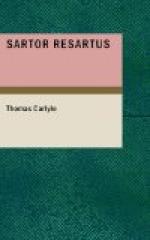Then we have long details of the Weinlesen (Vintage), the Harvest-Home, Christmas, and so forth; with a whole cycle of the Entepfuhl Children’s-games, differing apparently by mere superficial shades from those of other countries. Concerning all which, we shall here, for obvious reasons, say nothing. What cares the world for our as yet miniature Philosopher’s achievements under that “brave old Linden “? Or even where is the use of such practical reflections as the following? “In all the sports of Children, were it only in their wanton breakages and defacements, you shall discern a creative instinct (schaffenden Trieb): the Mankin feels that he is a born Man, that his vocation is to work. The choicest present you can make him is a Tool; be it knife or pen-gun, for construction or for destruction; either way it is for Work, for Change. In gregarious sports of skill or strength, the Boy trains himself to Co-operation, for war or peace, as governor or governed: the little Maid again, provident of her domestic destiny, takes with preference to Dolls.”
Perhaps, however, we may give this anecdote, considering who it is that relates it: “My first short-clothes were of yellow serge; or rather, I should say, my first short-cloth, for the vesture was one and indivisible, reaching from neck to ankle, a mere body with four limbs: of which fashion how little could I then divine the architectural, how much less the moral significance!”
More graceful is the following little picture: “On fine evenings I was wont to carry forth my supper (bread-crumb boiled in milk), and eat it out-of-doors. On the coping of the Orchard-wall, which I could reach by climbing, or still more easily if Father Andreas would set up the pruning-ladder, my porringer was placed: there, many a sunset, have I, looking at the distant western Mountains, consumed, not without relish, my evening meal. Those hues of gold and azure, that hush of World’s expectation as Day died, were still a Hebrew Speech for me; nevertheless I was looking at the fair illuminated Letters, and had an eye for their gilding.”
With “the little one’s friendship for cattle and poultry” we shall not much intermeddle. It may be that hereby he acquired a “certain deeper sympathy with animated Nature:” but when, we would ask, saw any man, in a collection of Biographical Documents, such a piece as this: “Impressive enough (bedeutungsvoll) was it to hear, in early morning, the Swineherd’s horn; and know that so many hungry happy quadrupeds were, on all sides, starting in hot haste to join him, for breakfast on the Heath. Or to see them at eventide, all marching in again, with short squeak, almost in military order; and each, topographically correct, trotting off in succession to the right or left, through its own lane, to its own dwelling; till old Kunz, at the Village-head, now left alone, blew his last blast, and retired for the night. We are wont to love the Hog chiefly in the form of Ham; yet did not these bristly thick-skinned beings here manifest intelligence, perhaps humor of character; at any rate, a touching, trustful submissiveness to Man,—who, were he but a Swineherd, in darned gabardine, and leather breeches more resembling slate or discolored-tin breeches, is still the Hierarch of this lower world?”




